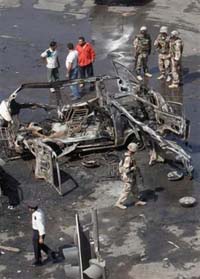U.S. soldier, six Iraqi civilians killed in Iraq's capital
Fighting between suspected insurgents and Iraqi police killed at least six civilians in Baghdad on Tuesday, and a roadside bomb killed a U.S. soldier on a foot patrol in another part of the capital, officials said. Another bomb destroyed a liquor store in Baghdad in what appeared to be the third attack on the shop by militants who are determined to impose Islamic customs in Iraq by closing down establishments such as liquor stores and beauty parlors. That blast, one of three heard just past dawn, shook much of central Baghdad.

The gunbattle in Baghdad broke out at about 10:30 a.m. between suspected insurgents riding in three cars and Iraqi police in Dora, one of Baghdad's most violent neighborhoods. At least six civilians were killed and four wounded in the crossfire, said police 1st Lt. Maithem Abdel-Razaq. The U.S. Army soldier died when a roadside bomb exploded near Rasheed airfield, a former Iraqi air force installation in southern Baghdad, damaging a Humvee and also wounding an Iraqi civilian, said police Lt. Mohammed Hanoun.
The soldier was on a foot patrol near the convoy at the time, the U.S. command said. The attack raised to at least 2,446 the number of members of the U.S. military who have died since the beginning of the Iraq war in March 2003, according to an Associated Press count.
At 6:10 a.m. a roadside bomb exploded in central Baghdad's Karradah shopping district, destroying the liquor store and damaging two nearby shops. None of the stores in the area had opened yet, and the blast caused no casualties, police said.
"This liquor shop has been targeted three times," said Falah Hassan, 50, the owner of one of the two damaged shops. "The first time it was hit by a grenade. The second time gunmen stormed it, hurt its workers and stole their money. Today, militants placed a bomb beside it," Hassan told Associated Press TV.
Some Muslim religious leaders in Iraq have tried to ban the drinking of alcohol, even though it is legal under the country's new constitution. Many of Baghdad's liquor stores are operated by Iraq's Christian minority, and some have been threatened or closed by Islamist militants, who also often demand that women wear veils while in public.
In other violence Tuesday, according to police:
_Suspected insurgents attacked a police patrol at 7:30 a.m. in Kirkuk, 290 kilometers (180 miles) north of Baghdad, killing two policeman, said police Col. Anwar Hussein said.
_A drive-by shooting killed an Iraqi man in Kut city, 160 kilometers (100 miles) southeast of Baghdad, who had served as a secret agent in Saddam Hussein's government.
_A roadside bomb exploded at 8:30 a.m. near a police patrol in western Baghdad, wounding one policeman, said police Lt. Thair Mahmoud.
The violence came as Iraqi lawmakers alternately and with varying degrees of sincerity withdrew from the Cabinet negotiations or threatened to do so, and accused each other of greed, sectarianism and self-interest. Deputies said Prime Minister-designate Nouri al-Maliki could announce a partial Cabinet ahead of a constitutionally mandated May 22 deadline, taking for himself the disputed defense and interior ministry posts.
President Jalal Talabani, however, rejected that option. "The presidency council does not want to see such key ministries excluded," Talabani said Monday after meeting with his Shiite and Sunni Arab vice presidents. "We think the entire Cabinet should be announced."
"The defense and interior ministries are important, and we have previously agreed that they should be taken by independents agreeable to all the main blocs in Iraq," he said.
Vice President Tariq al-Hashimi, a member of the Sunni Arab Accordance Front, said it had reached a deal with the main Shiite United Iraqi Alliance in which the Sunnis would nominate the defense minister. In return, the Shiite bloc would name the interior minister.
Similar deals have unraveled over the past few days. Shiite lawmaker Ali al-Deeb, a member of al-Maliki's Dawa Party, told the AP that "the Defense Ministry is still a problem."
Former Prime Minister Ayad Allawi's secular Iraqi List, favored to get the defense post, accused the Sunnis of delaying the process and of stoking violence as a pressure tactic. "The ceiling has been set too high by the Accordance Front who claim they represent the Sunnis. They still insist on the Defense Ministry," Wael Abdul-Latif, the bloc's spokesman, told the AP. "But the bombs are still playing a role in the negotiations", reports the AP.
N.U.
Subscribe to Pravda.Ru Telegram channel, Facebook, RSS!


